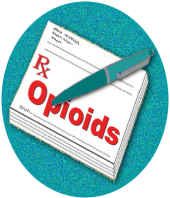I have been hearing more and more these days that doctors are handing out high-potency pain killers like they are candy and I have been wondering why, when these drugs have a history of being so addicting, doctors are so keen to prescribe then for even the most menial of pains. The drugs I am talking about are the opioids: morphine, hydrocodone, codeine…heroin, the list goes on and on. Derived from the opium plant, these drugs are the pinnacle of analgesic and anesthetic drugs, with morphine as the baseline that most analgesics are compared to. It is the fact they do their job so well that makes them so addicting. So again I ask why are they still being used?
In this weeks discussion, we talked on what we thought about how easy it was to get opioids and a few ways we thought opioids research could go in order to keep the analgesic effect but lessen or eliminate the addicting effects. Opioids have strict regulations on what factors illicit their prescription but it seems that the enforcement of their distribution is on the weak side. What one person brought up was that if a patient goes into the doctor and ends up coming back for the same exact problem, the insurance can deem the first visit ineffective in a way and refuse to pay the cost. So doctors end up “over-prescribing” in a way to make sure the patient doesn’t return for the same problem. This brought us to talking about what can be done to reduce or eliminate the dependency/addiction issue. Analgesic/anesthetic drugs are a dangerous kind of drug because even if you don’t develop a dependence for them, you can still get addicted to them. What I mean is that even if the drug was made so that you didn’t develop a resistance and you could stop taking it with no side effects, the fact that it rids you of pain and makes you feel good makes it pleasurable to take.
Another question brought up was how can addiction be dealt with in a mind over matter approach. I think that the brain (mind) has the biggest role in addiction because addiction is all about dopamine release in the brain. Dopamine is the “feel good” chemical in the brain that’s in charge of rewards and such. It’s that feeling you get when you have your favorite food or when you are swarmed by a mob of playful puppies. It’s your bodies signal of what you like and what you don’t like. Back to the addiction aspect of dopamine. When you take a drug, such as heroin, dopamine is released in great quantities which results in the euphoric effects. As you continue to take it, your body compensates for the increase in dopamine release, resulting in you having to take more to feel the same effects. Now fast-forward to when you stop taking the drug. You start going through withdrawals which is what happens when you have that constant inflow of dopamine and all of a sudden its gone. You feel absolutely dead and you just can’t function without more of the drug. Could you avoid the withdrawals by conditioning your brain to not need the drug anymore? Could you associate the drug with something you don’t like and replace it with something that was not as bad for you and easier to get?
I’ll try to explain what I am talking about. Say you are taking heroin. You are addicted but want to quit and know you should. Can you start doing something not pleasurable while taking heroin to in turn make taking heroin not pleasurable? Then can you substitute heroin with something not illegal or harmful but still pleasurable so you can kick the heroin habit? I think it is possible but of course the only way to know is to actually do it but that may easier said then done.
Opioids and Addiction
